Spotlight on Bryan Derballa
Oct 15, 2011
Originally Posted 08/13/2011
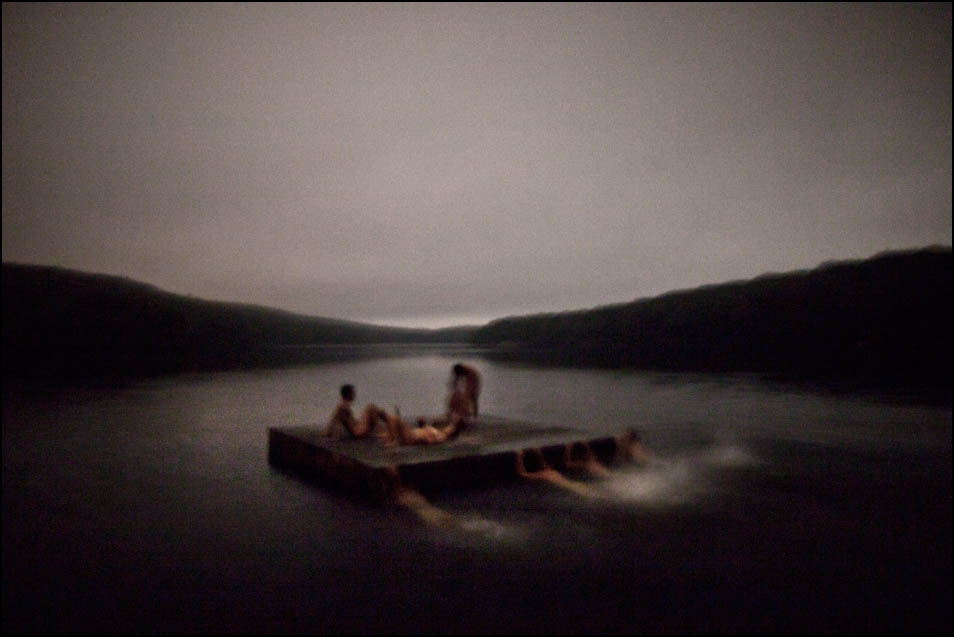
BRYAN:
Abandoned. Summer. Camp. I don't know what emotions
those three words stir up for the readers out there. But
for me, there is hardly anything in the world that sounds
as exciting. I grew up in the mountains of North Carolina
and swimming holes have long been essential to my
existence. So when a friend was organizing a trip to this
secret spot north of New York City, I knew I had to be there.
I'd been shooting assignments six or seven days a week all
year, taking everything that came my way because you never
know when it might dry up. But this was the perfect reason
to take off. So I piled into a car full of friends listening to
Canned Heat and John Cougar Mellancamp, leaving the city and
assignment work behind. Of course I brought a camera but
photography was really an afterthought. I was more concerned
with being around friends, being in water, and being a part of
this imminent adventure.
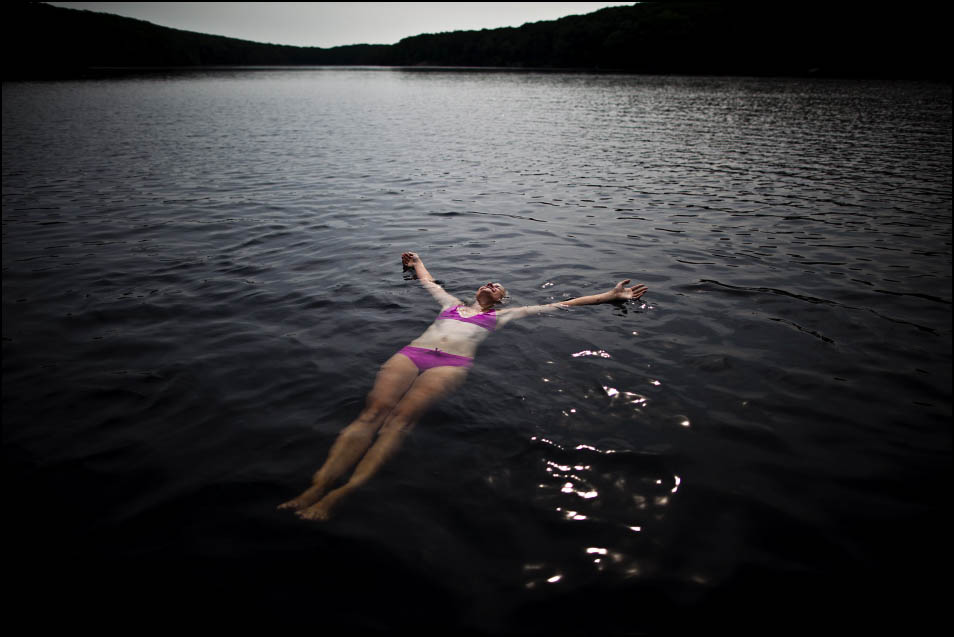
TID:
I mentioned this in an earlier email to you - that this image
reminds me of years ago, when I used to go swimming late
at night with friends. There was so much freedom in that
experience, and in our youth. I remember feeling like it would
never end. Those were some of the most wonderful days, and
it's a sentiment I'm sure many can relate to.
How do you approach making images from your own life, and
what do you learn from these experiences?
BRYAN:
In an episode of "This American Life" about Prom, Ira Glass
describes it as "fraught with possibility." I didn't go to my
prom but it's a idea that I can relate to over and over.
Some of the strongest feelings of my youth come from the
idea of the unknown, that anything could happen. Then
when the experiences exceed the expectations, it's pure
magic.
Those are the moments I'll remember forever.
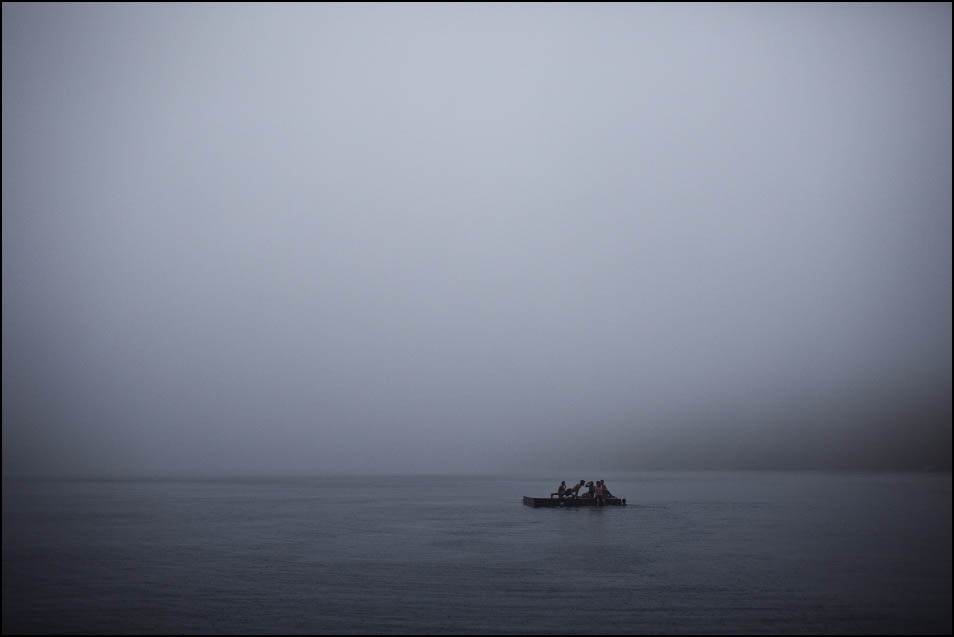
As we get older and fall into routines and learn more of the
world and how it works, we're often left with less opportunities
that feel "fraught with possibility." One of the reasons I am
a photojournalist is because each assignment has the potential
to border on such an opportunity. But it still doesn't whirl up
the same feelings as my first time skinny dipping, or
house party in high school, first road trip with friends
or first visit to Europe. When I am confronted with those times
in my personal life, that's probably when I'm most inspired to shoot.
It's an emotional compulsion. Then looking back at those photos,
it reminds me of what I value.
TID:
Lets talk about the main image. Tell us what led up to it,
as well describe what was going on in the moment.
BRYAN:
All these photos are from a 24-hour period. We made it to
the abandoned summer camp in the late afternoon when the
sun was blazing and we immediately started jumping and
diving off everything in sight. We were probably there for an
hour before a park ranger materialized out of the woods. He
ran our IDs and told us we were trespassing and had to leave.
Demoralized, we hiked back to the car just as another group of
friends was rolling in. They missed the ranger so they took off
for the lake to set up camp.
We drove around looking for a place to stash the car so the
ranger wouldn't know that we went right back to trespassing.
As we were trying to hide the car off a dirt road we got caught
a second time by the same guy! It was so embarrassing. I felt
far too old to get in trouble for this kind of shit. He just told us
to keep moving. But still determined, we hid the car on the
other side of the lake and hiked in under the cover of night. Our
other friends already had a fire going and were partying. We
joined in and all the anxieties of getting caught by the ranger
slipped away.
Finally at about 2am, everyone was feeling adventurous enough
to skinny dip. Ten of us were diving and floating in all our glory.
Although there was no moon or available light and I never really
carry a flash, I still felt compelled to take pictures. It was exactly
one of those experiences that you never want to end. I did what I
could to just get it in the camera -- to put that memory away for
safe keeping.
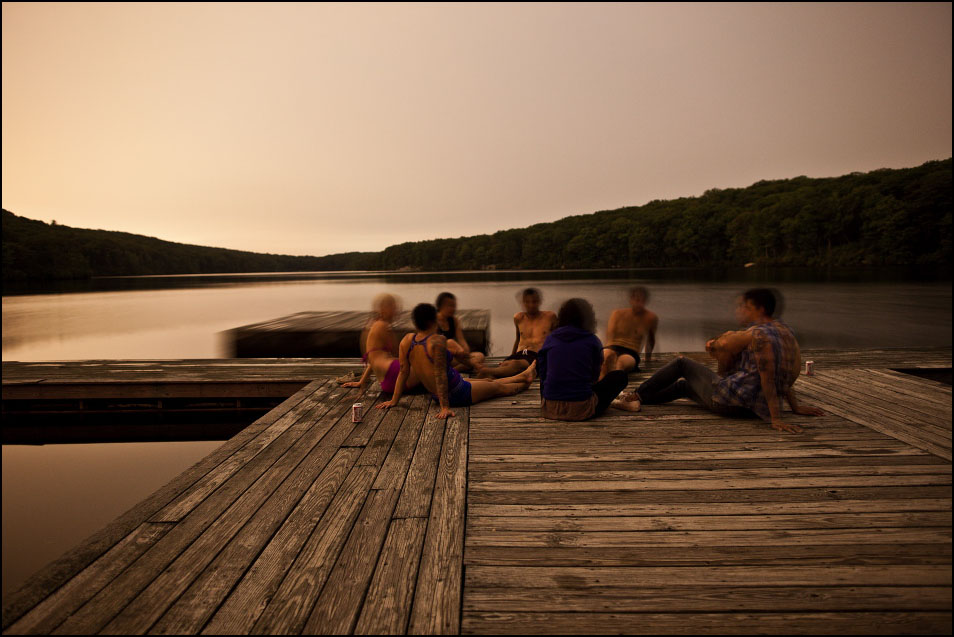
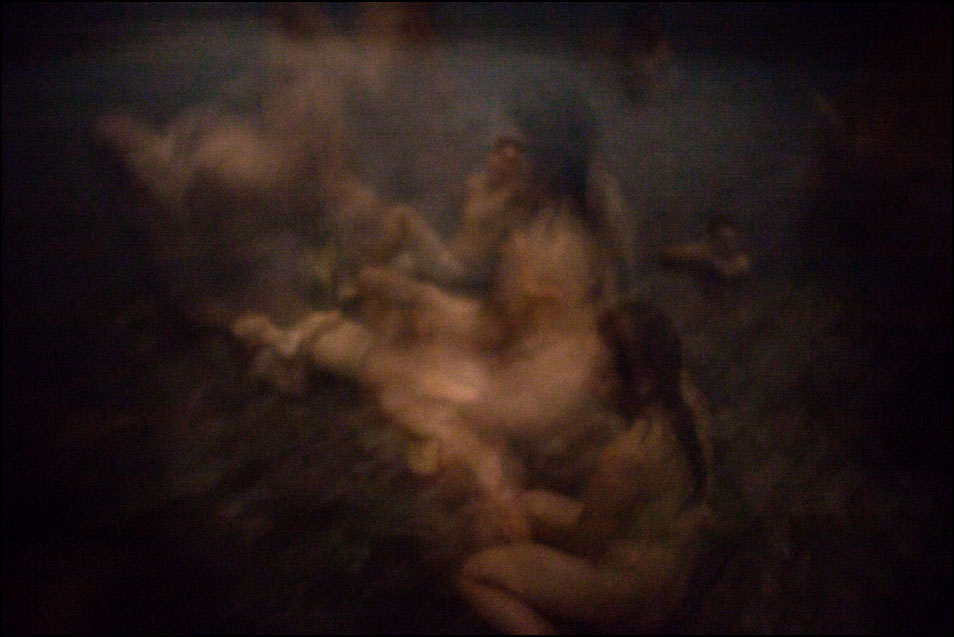
I started out by setting my camera on the railing of the dock and
just leaving it with long exposures. But it felt too static, like I was
waiting and not interacting. Instead, I turned up my ISO higher
than I ever had before and handheld my camera for two or three
seconds at a time, hoping something would come out. Standing
there naked on the dock, I did whatever I could to capture that
feeling without interrupting it. So when my friends were swimming
the floating dock out to the middle of the lake, one of the pictures
happened to come out. When I felt like I'd done enough, I set my
camera on the dock and jumped in to meet them.
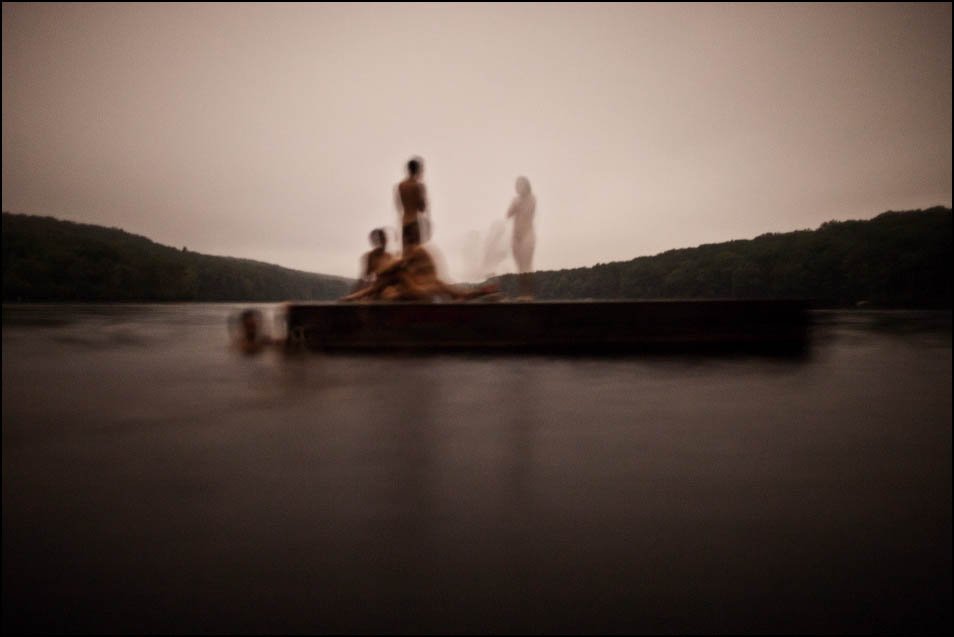
After swimming the rain started so we climbed through the window
of one of the abandoned cabins. Some of us swept the dust while the
others gathered dry wood to start a fire in the fireplace. We all piled
in, sleeping shoulder to shoulder across the floor. Someone brought
a little set of speakers and I deejayed sing-a-longs late into the
night. At some point no one was left and I faded out with Sigur Ros.
It was probably around 4am. At 7 am we woke up and the lake was
entirely fogged over. We had to go for one last swim before leaving.
With the fog and lack of sleep it felt like diving in to a dream. It was
totally surreal.
TID:
In an earlier conversation you said that you thought it was
representative of how you see yourself. What do you mean?
BRYAN:
This trip was a pretty big departure from my everyday life in
New York. But it represents how I like to view myself -- free,
uninhibited, adventurous. The sincerity of the night and
seeking something beyond the normal routine of life; those
are things that are really important to me. And all the emotions
wrapped up in the night, in the interactions, in our heads, in
the pictures. I'm always looking for some kind of strong emotional
response, whether it's from music or movies or photos or real-
life events. It could be sad, ecstatic, nostalgic, or loving, just so
long as I'm feeling something.
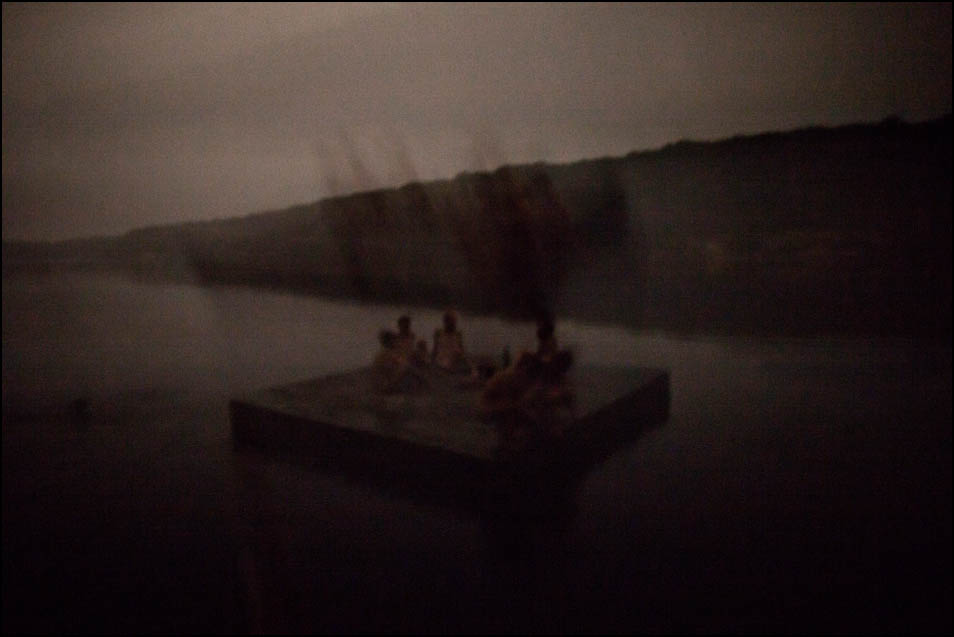
So that's what I care about and that's what moves me. But it's
not necessarily how I always live my life. It's the battle between
the ideal self and actual self. My actual self is probably pretty
neurotic and often preoccupied with unimportant things. But
that freedom, sincerity and emotional drive still exists in me.
It's just that I probably extrapolate from those attributes and
leave the more boring ones on the cutting room floor when
constructing an idea of who I am.
TID:
You also said that it was a break from your
usual style. Why was that important to note?
BRYAN:
This kind of relates to my answer in the last question. I tend to
shoot two different ways. Often I keep everything in good visual
order with clean lines and each element has its own place. My
desk is the same way. Everything is at right angles and evenly
spaced. That's the neurotic part. I don't necessarily like it, but
it's been useful. That's how I shoot when my actual self is in control.
Then other times, when I'm really emotionally invested in what I'm
shooting, things get a lot looser. Photos become more like poems
than architecture. My pictures get messy, dark, and blurry. But
usually it's a much better representation of what I'm feeling. My
emotions are never neat and orderly. I could have just as easily
set up a couple strobes and a tripod and shot my friends on the
dock that night to look like a magazine spread but it wouldn't have
felt the same. Instead I immersed myself in the experience and I
shot uninhibited from the heart. I think because of that the pictures
are as true to the events as I could make them.

TID:
What surprised you during the making of these images?
BRYAN:
I wasn't even paying attention to the screen on my camera. I was
just snapping and hoping something would come out. I was much
more surprised when editing a couple days later. A few photos
have a double exposure feel. I guess I moved pretty significantly
during the long exposure and made two exposures on the same
frame. I wish I could say it was intentional because it looked
good. Overall, I was most surprised that the photos looked like
how that night felt.
TID:
What did you learn from the experience that you previously
didn't know?
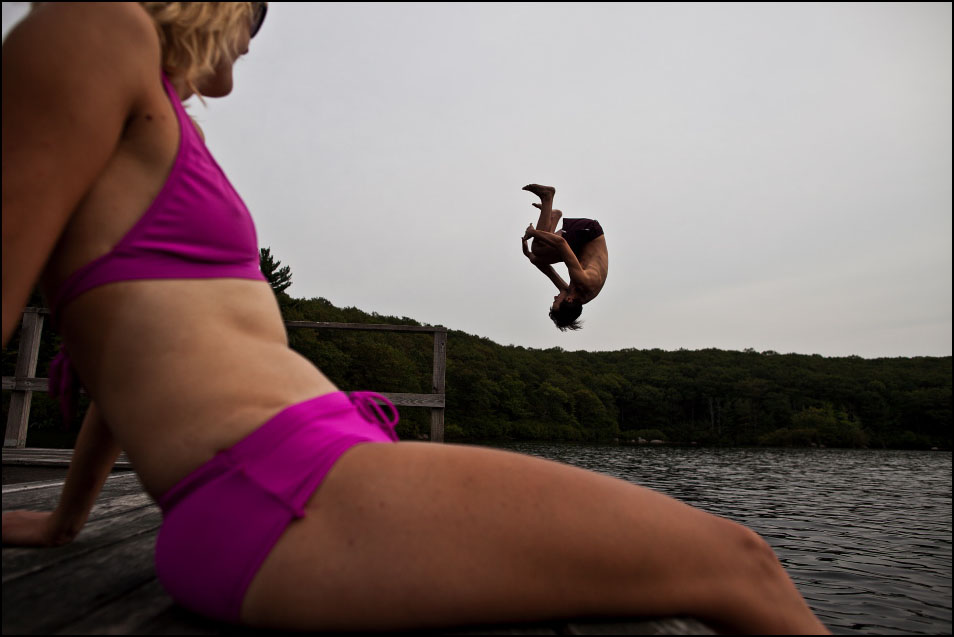
BRYAN:
I don't think I learned anything new. It just reinforced the
idea that I need to keep pushing myself. The first time I
ever met John Francis Peters (www.jfpetersphoto.com), he
told me that he thought photography was in its infancy.
That's really stuck with me. Compared with another medium
like painting, photography has just started. There's so much
more we can do. That's also one of the reasons I embrace
digital. With film, it's really difficult to do something visually
unique that wasn't done 25 years ago. But with digital,
I'm making color photos at 6400 ISO in pitch black night
without a tripod. I don't think everyone has seen that.
TID:
I really admire the intimacy in your work, it seems that
the people you photograph feel very comfortable in your
presence. How do you think you accomplish this?
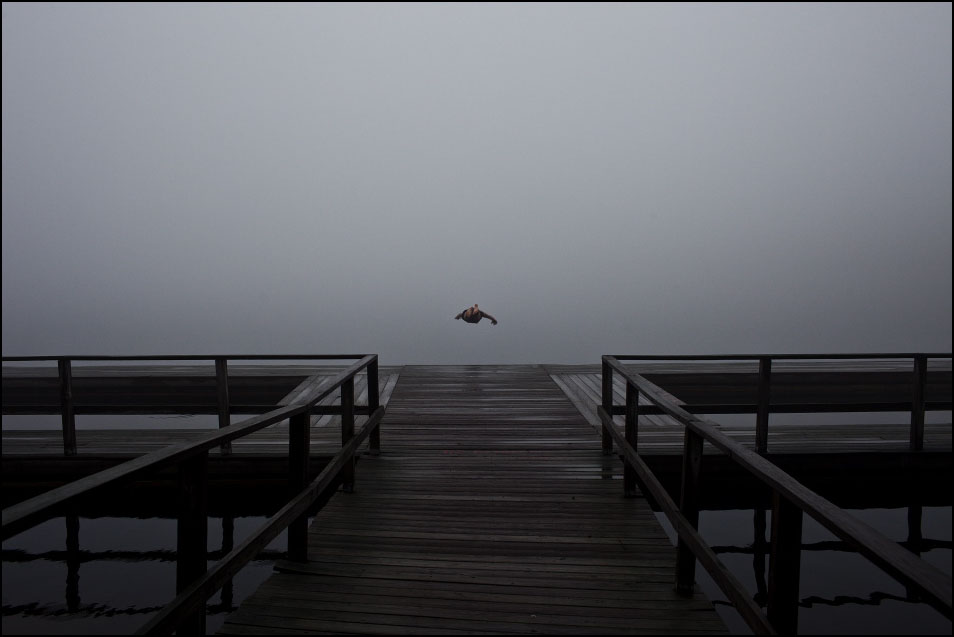
BRYAN:
I wish that was true. I photograph uncomfortable people all
the time. I just try to share a part of myself in hopes that folks
will do the same. It's the same way I try to connect with people
at the dinner table. Talk about shared interests. I also like to
help people understand what I'm trying to do. To tell them that I am
looking for intimacy and reality in the my photos. Most folks
respect that.
On the night of these pictures, there were a few people that
I'd never even met. We got to know each other around the fire,
but not much. It probably helped that I was the first person
naked. If I'm swimming in a lake at night, it's gotta be naked.
And I was naked when I was shooting the photos of them
naked. Also, everyone was a little drunk and it was so dark.
If they were aware I was shooting, they probably didn't think
anything would come out. I don't drink and never have but I
don't like to make a point of it when other people are drinking.
I've found that it makes them self-conscious about being drunk.
Making someone self-conscious is the last thing I want.
TID:
What do you think you learn from documenting your
personal life that applies to your professional life?
BRYAN:
I'm much more inclined to try new ways of seeing and
communicating when shooting my personal life. There's
no risk involved and more room for error. I don't have to
worry about things being too abstract or obtuse for the
newspaper when I'm shooting my own life. Once I refine
those methods I can use them while on assignment. As for
connecting with people, I try to do that the same regardless
of whether or not I'm getting paid.
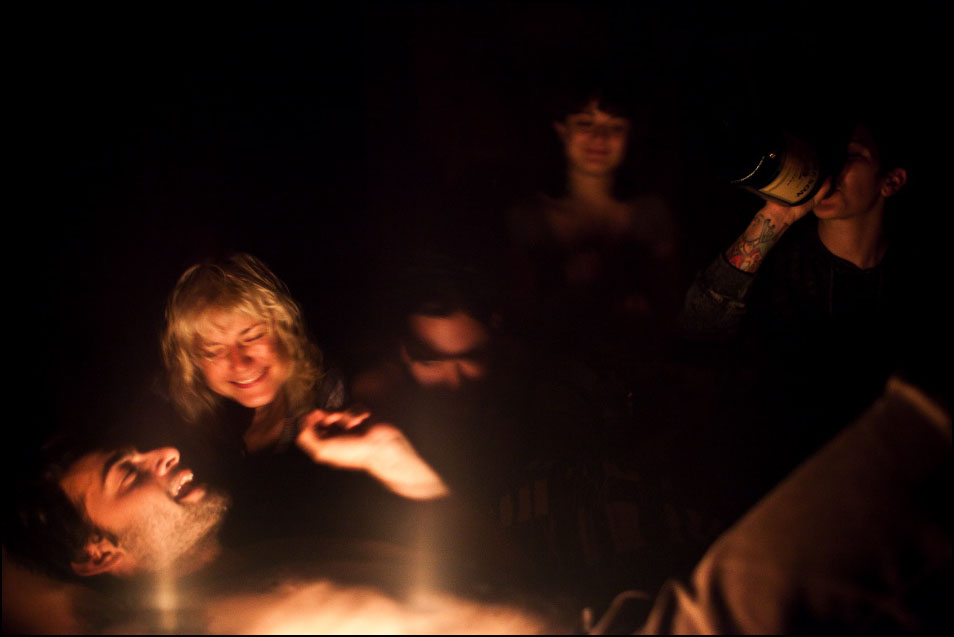
TID:
Finally, what do you wish you had done differently that weekend
photographically?
BRYAN:
The fact that anything came out was such a pleasant surprise,
I don't think I could have wished for anything more. Well this
is pretty nerdy, but I do wish I had my Canon wireless transmitter.
It goes on top of the camera and is supposed to trigger strobes,
but it also sends out an infrared beam to get the focus in the
dark. I don't want the strobes but the focus would have been
nice. I don't know if any of the pictures would have been less
blurry but it I probably could have been more free without
trying to find the focus in the dark.
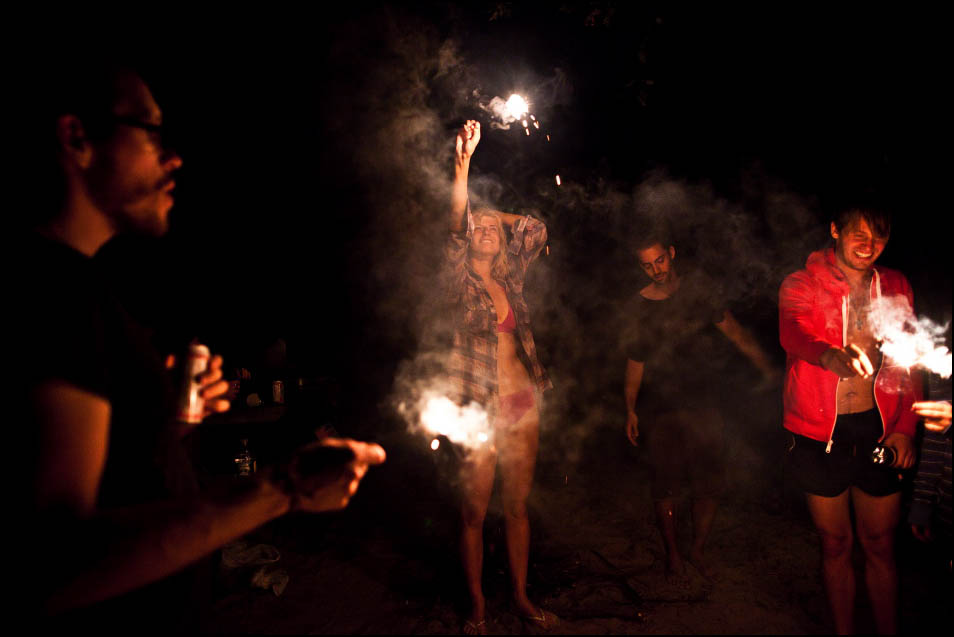
TID:
Thanks so much, Bryan.
+++++
Bryan Derballa is a documentary photographer living in Brooklyn, NY. He works regularly for The Wall Street Journal, The FADER, The Daily, The Financial Times, Wired.com, Huck, and Juxtapoz. And he's not beyond doing commercial work for the likes of Nike, Adidas, and Palladium Boots either. Photographically, he's really interested in capturing feelings. Whatever that means.
You can view more of his work here:
+++++
Next week we'll feature this surprising image of U.S.
Representative Charles Rangel, made by Melissa Golden:
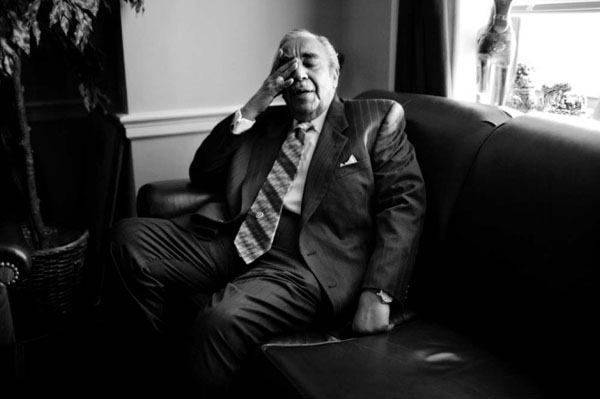
As always, if you have a suggestion of someone, or an image you
want to know more about, contact Ross Taylor or Logan Mock-Bunting:
[email protected]
[email protected]
For FAQ about the blog see here: